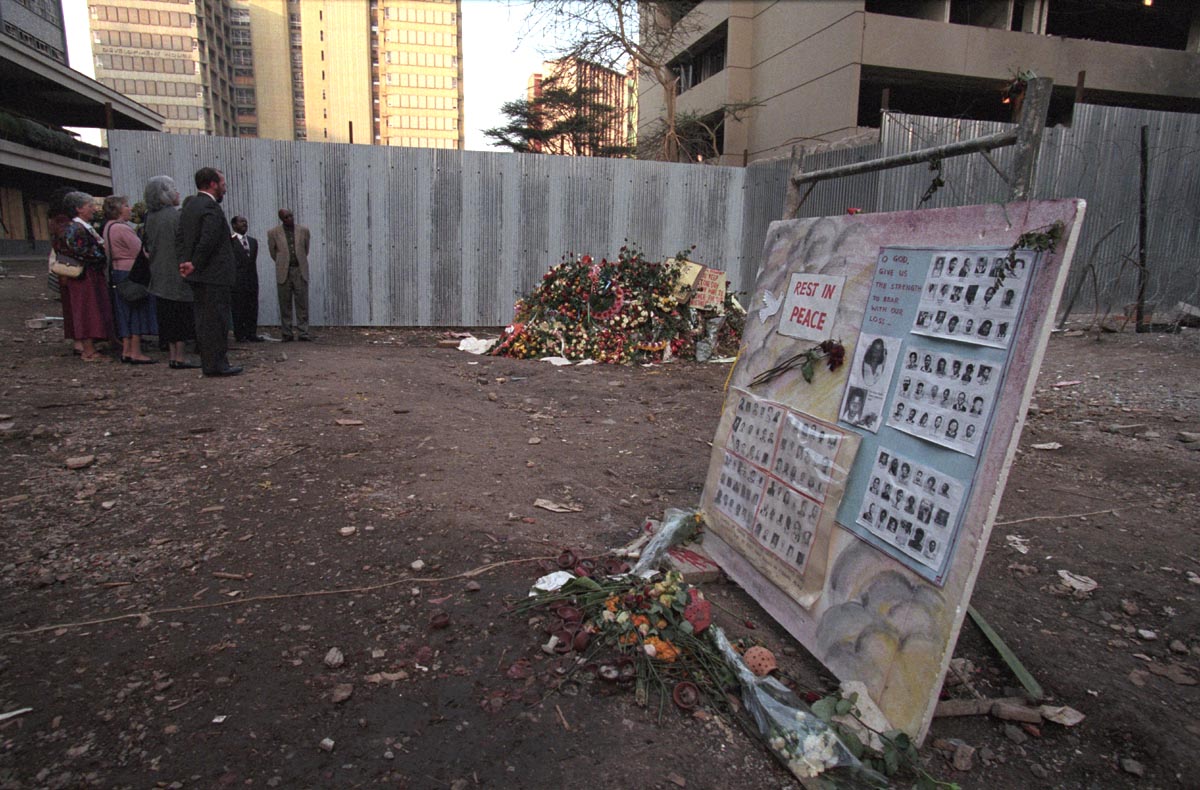
RICHMOND, Va. (BP)–Connie Burton remembers two things about the aftermath of the terrorist bombing that destroyed the U.S. Embassy in Nairobi, Kenya, five years ago.
The body bags. And the smell.
“I remember standing on top of that mound of rubble at the bomb site,” says Burton, a longtime Southern Baptist missionary who now works as a nurse at the Missionary Learning Center near Richmond, Va. “There was a Marine there, and all he was doing was laying out body bags. He lined them up meticulously, three deep, exactly the same distance apart. It struck me that it was the only control he had over anything going on around him.”
The smell came from bodies of victims still buried in the smoking ruins two days after the Aug. 7, 1998, blast.
“You never forget it,” she says. “If I close my eyes I can smell it now.”
CARRYING OUT BODIES
Missionary Jon Sapp remembers, too. He and other missionaries went to the site to assist rescue workers who were exhausted and caked with white dust after many hours of digging for survivors.
“I think we took out 21 or 22 bodies,” recalls Sapp, now the International Mission Board’s regional leader for East Africa. “They were at the very bottom of the [four-story] building that came down on them.”
The explosives that set off the blast were hidden in a pickup truck driven up to the embassy on a busy downtown street in Nairobi, Kenya’s capital. A nearly simultaneous bombing devastated the U.S. Embassy in Dar es Salaam, Tanzania. Both attacks later were traced directly to al-Qaida, Osama bin Laden’s terrorist group. The bombings killed 231 people, including 12 Americans.
The attacks “marked the crystallization of al-Qaida as a global terrorist network that could threaten Americans,” analyst Jonathan Stevenson recently told the Associated Press. Stevenson works with the International Institute for Strategic Studies in London.
Bin Laden may have been connected to earlier attacks, including the first bombing at the World Trade Center in 1993. But the embassy attacks “were the first wakeup calls that there was an anti-American group ready to attack at vulnerable points throughout the world,” Stevenson said. They set the stage for the 9/11 attacks and other al-Qaida terrorist operations in Indonesia, Morocco, Saudi Arabia and elsewhere.
MORE AFRICANS THAN AMERICANS
While the embassy bombings targeted Americans, they killed and injured far more Africans. In the days after the Kenya blast, Burton, Sapp and others mobilized missionaries, church members and volunteers to feed rescue workers and visit hospitals packed with the injured. Oklahoma Baptists — who had their own firsthand experience with a terrorist bombing — quickly sent volunteer counselors to train Kenyan church members to minister to Kenyans suffering from the trauma of the event.
The Southern Baptist workers focused special attention on helping rehabilitate the numerous Kenyans blinded by the explosions — a heartbreaking example of the sadistic nature of the attack. Many buildings in downtown Nairobi have glass fronts. On the day of the attack, the terrorists threw several grenades before the main bomb detonated. When people inside the buildings heard the small blasts and ran to the windows to see what was happening, the big explosion sent shattering window glass into their eyes.
The bombing and its aftermath changed Burton.
“Anytime you brush with death or deal with a situation where it could have been you, you re-evaluate where you are and your relationship with the Lord,” she reflects. “It definitely gives you a great sense of urgency. Here are all these people killed. Did they know the Lord?”
Al-Qaida and other terrorist groups continue to operate in Kenya and elsewhere in east Africa, as evidenced by the deadly attack on a Kenyan coastal resort hotel in January. The U.S. government issued advisories earlier this year warning Americans to avoid travel to the region.
WHAT WILL IT TAKE?
“Terrorism affects us more than it ever did before,” says Sapp, noting that more than half of his region’s requests for Southern Baptist volunteers have gone unfilled so far this year. What will it take to reverse that trend?
“What it’s going to take is people sensing that God protects and provides for us, as He’s done many times in the past. We need to be wise about where we invest ourselves, but [the bombing] was the first of many events that continue to demonstrate we’ve got to be about the business of getting the good news to people who don’t understand it.”
Kenyan Baptists have taken that message to heart — and they’re acting on it.
“They realize more than ever before the importance of being a witness among the communities here that don’t have any interest or background in the Christian faith,” Sapp said. “We’ve got churches adopting people groups. We’ve got lay folks involved in church planting. They’ve realized they’re a part of a world that needs the knowledge of the Lord.”
–30–
(BP) photos posted in the BP Photo Library at http://www.bpnews.net. Photo titles: NAIROBI MEMORIAL and FIVE YEARS LATER.
— Learn more about missions outreach in East Africa:
http://www.peopleteams.org/EAFco.htm.
— STORIES FROM THE 1998 BOMBING:
Missionaries on front lines after Nairobi bomb disaster,
http://imb.org/core/story.asp?id=243.
Hope in Nairobi rises amid devastation,
http://imb.org/core/story.asp?id=247.
Nairobi ministries continue in wake of embassy bombing,
http://imb.org/core/story.asp?id=252.
Missionary brings light into bombing survivors’ darkness,
http://imb.org/core/story.asp?id=344.














